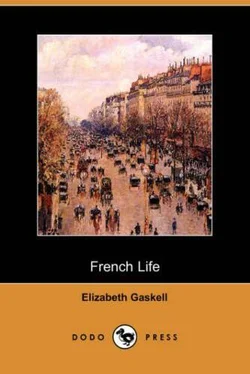As to dress, from what I can gather, I think that good articles bear the same price as in England; but in our shops it is difficult to meet with an inferior article in even moderately good taste, while in France those who are obliged to consider expense can find cheap materials of the most elegant design. Then French ladies give up so much more thought and time to dress than the English do; I mean in such ways as changing a gown repeatedly in the course of a day if occasion requires, taking care never to wear a better dress when an inferior one will do — no! not even for five unnecessary minutes. And, when handsome articles are taken off, they are put by with as much care as if they were sleeping babies laid down in a cot. Silver paper is put between every fold of velvet or of silk; cushions of paper are placed so as to keep the right sit of any part; ribbons are rolled up; soiled spots are taken out immediately; and thus the freshness of dress which we so much admire in Frenchwomen is preserved; but, as I said, at a considerable expense of time and thought in the case of people of moderate means. Madame — declares that she knows many a young French couple who have reduced their table to the lowest degree of meagreness, in order that the wife (especially) might be well dressed. She says that dress is the only expenditure for which a Frenchwoman will go into debt.
I remember some years ago hearing a letter from the Prince de Ligne read at Lord E-'s. He gave an account in it of the then recent coronation at Moscow, and went on to speak of the French Emperor's politics. As one of his engines of influence, the Prince gravely named le luxe de la toilette , as an acknowledged political means. At the time, I remember, I wondered in silence; but things have come to my knowledge since then which make me understand what was then meant. Six years ago a friend took me to call on Madame de — . It was a raw, splashy, February day; and, as we walked through the slushy streets, half-covered with melting snow, my friend told me something about the lady we were going to see. Madame de — was married to the eldest son of a Frenchman of rank; she herself belonged to an old family. Her husband was a distinguished member of one of the Academies, and held a high position among those who had devoted themselves to his particular branch of recondite knowledge. Madame de — was one of the lionnes of Paris, and as a specimen of her class we were now going to see her. She and her husband had somewhere about seven thousand a year; but for economy's sake they lived in an apartment rather than a house. They had, I think, two or three children. I recollect feeling how out of place my substantial winter-dress and my splashed boots were, the moment I entered the little ball or anteroom of her apartment.
The floor was covered with delicate Indian matting, and round the walls ran a bordering of snowdrops, crocuses, violets, and primroses, as fresh and flowering as if they were growing in a wood, but all planted by some Paris gardener in boxes of soil, and renewed perpetually. Then we went into the lady's own boudoir. She was about thirty, of a very peculiar style of beauty, which grew upon me every moment I looked. She had black hair, long black curling eyelashes, long soft grey eyes, a smooth olive skin, a dimple, and most beautiful teeth. She was in mourning; her thick hair fastened up with great pins of pearls and amethysts, her ear-rings, brooch, bracelets, all the same. Her gown was of black watered silk, lined with violet silk (wherever a lining could be seen), her boots black watered silk, her petticoat of stiff white silk, with a wreath of violet-coloured embroidery just above the hem. Her manners were soft and caressing to the last degree; and, when she was told that I had come to see her as a specimen of her class, she was prettily amused, and took pains to show me all her arrangements and coquetteries . In her boudoir there was not a speck of gilding; that would have been bad taste, she said. Around the mirrors, framed in white polished wood, creeping plants were trained so that the tropical flowers fell over and were reflected in the glass. There was a fire, fed with cedar-wood chips; and the crimson velvet curtains on each side of the grate had perfumes quilted within their white silk linings. The window-curtains were trimmed with point lace. We went through a little ante-chamber to Madame de — 's bed-room — an oblong room, with her bed filling up half the space on one side; the other all wardrobe, with six or seven doors covered with looking-glass, and opening into as many closets. After we had admired the rare Palissy ware, the lace draperies of the mirror, the ornaments on the toilette-table, and the pink silk curtains of the bed, she laughed her little soft laugh, and told me that now I should see how she amused herself as she lay in bed of a morning: and pulling something like a bell-rope which hung at the head of her bed, the closet doors flew open, and displayed gowns hung on wire frames (such as you may see at any milliner's): gowns for the evening, and gowns for the morning, with the appropriate head-dresses, chaussures , and gloves, lying by them.
"I have not many gowns," said she. "I do not like having too many, for I never wear them after they are a month old; I give them to my maid then, for I never wear anything that is old-fashioned."
I was quite satisfied with my lionne . She was quite as much out of the way of anything I had ever seen before as I had expected. But, to go on with the bearing she had upon the Prince de Ligne's letter, I must not forget to say that Madame de — expressed very strong political opinions, and all distinctly anti-Bonapartean. Among other things she mentioned was the fact that, when her husband went to pay his respects as a member of the Academy of — , to the Emperor at the Tuileries, she would not allow him to use their carriage (nor indeed was he willing to do it, but went in a hackney coach), saying that the arms of the de — s should never be seen in the courts of a usurper. Two years afterwards I came to Paris, and I inquired after M. and Madame de — . To my infinite surprise, I heard that he had become a senator, one of that body who receive about a thousand pounds a year from Government, and who are admitted to that dignity by the express will of the Emperor. How in the world could it have come about? And Madame, too, at all the balls and receptions at the Tuileries! The arms of the de — were no longer invisible in the courts of a usurper. What was the reason of this change? Madame's extravagance. Their income would not suffice for her luxe de toilette , and the senator's salary was a very acceptable addition.
April 24 th . - We were asked to go in some evening, pour dire le petit bon-soir , at a neighbour's house. Accordingly we walked thither about eight o'clock. M. E-'s house is one of the most magnificent in this quartier : it is on the newly-built Boulevard de Sévastopol. M. E- himself is a leading man in his particular branch of trade, which, in fact, he has made himself; and he is now a French millionaire, as different from an English one as francs are different from pounds. I remember, when I first knew monsieur and madame, they lived in an apartment over the shop; and this was situated in one of the narrow old streets of the Quartier Latin. I was asked there to dinner, and I had to make my way through bales of goods, that were piled as high as walls on each side of the narrow passage through the shop. I went through madame's bed-room, furnished with purple velvet and amber satin, to the room where we assembled before dinner.
It was a weekly dinner, at which all M. E-'s family came, as a matter of course; and any one connected with him in business was also sure of finding a place there. The table was spread with every luxury, and there was almost an ostentatious evidence of wealth, which contrasted oddly and simply with the hard signs of business and trade down below. I fancy their way of living at that time must have been like that of the great old City families of the last century. And there was another resemblance. Two generations ago it was customary for our own London merchants to retain their married children under the paternal roof, for the first year at least; and so it was at M. E-'s. His own child, his wife's children — for they had each been married before — lived in the same house as he did, both in winter and summer, in town and country. Yet the younger generation were all married, and had families. All the grandchildren, little and big, were assembled at these weekly dinners; if there was not room for them at the principal table, there were nurses and servants ready to attend upon them at side-tables. And now, when increasing and well-deserved prosperity has enabled M. E- to remove into the large hotel to which we have been to-night, to "say our little good-evening," I find that his sons and his daughters, his maid-servants and his men-servants, have all migrated with him in truly patriarchal fashion.
Читать дальше












